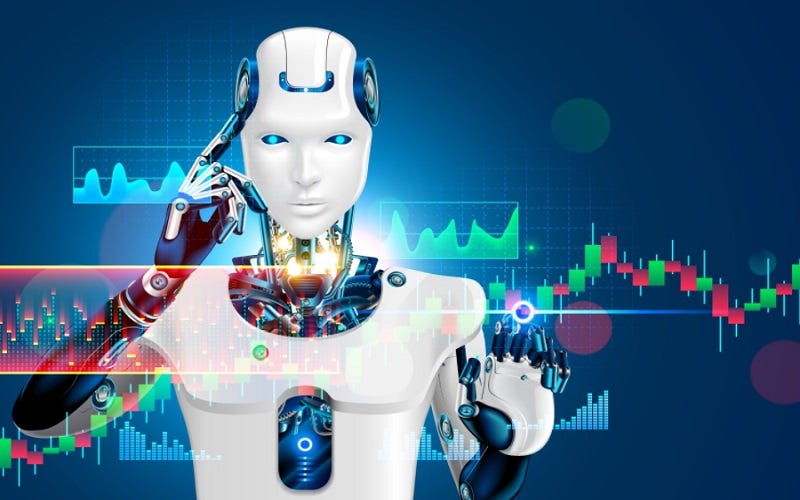How AI and Blockchain Are Transforming the Future of Trading
The world of trading is undergoing a massive transformation. With the rapid advancement of technology, Artificial Intelligence (AI) and Blockchain are at the forefront of this revolution — making trading faster, smarter, more secure, and accessible. Whether it’s Wall Street or cryptocurrency exchanges, the future of trading is being reshaped in real-time.
In this article, we’ll explore how AI and blockchain are disrupting traditional systems and what the future holds for investors and traders.
🔍 What Is AI and Blockchain in Trading?
Before diving deep, let’s clarify the basics:
-
AI (Artificial Intelligence) in trading refers to the use of machine learning, data analysis, and algorithms to predict market trends, execute trades, and automate decision-making.
-
Blockchain is a decentralized, distributed ledger technology that ensures transparency, security, and immutability — making it ideal for verifying and recording trading transactions.
Together, these two technologies are transforming how financial markets operate.
🤖 1. AI Is Revolutionizing Market Analysis
AI-powered tools can process massive amounts of data in milliseconds — far beyond human capability. Here’s how:
-
Predictive Analytics: AI analyzes historical data to forecast market trends and price movements.
-
Sentiment Analysis: AI scans news articles, tweets, and online sentiment to assess market mood.
-
Pattern Recognition: Algorithms identify trading patterns that humans often miss.
-
Real-Time Decision Making: AI bots can make buy/sell decisions instantly, optimizing profits.
Result: Faster, more accurate trades and reduced human error.
🔗 2. Blockchain Is Making Trading More Transparent
Blockchain eliminates the need for intermediaries by offering secure, peer-to-peer transactions. Here’s what it brings to the table:
-
Transparency: Every trade is recorded on a public ledger, making manipulation extremely difficult.
-
Security: Transactions are encrypted and nearly impossible to hack.
-
Lower Fees: No middlemen = reduced transaction costs.
-
24/7 Trading: Blockchain enables global, round-the-clock trading — especially in crypto markets.
Use Case Example: Decentralized exchanges (DEXs) like Uniswap and PancakeSwap run entirely on blockchain, allowing anyone to trade without a central authority.
🧠 3. Smart Contracts: Automating the Trade Lifecycle
Smart contracts — powered by blockchain — are self-executing agreements with terms directly written into code.
How they’re transforming trading:
-
Instant Settlements: No need to wait for a third party to confirm a trade.
-
Fewer Disputes: Everything is pre-agreed and automated.
-
Efficient Clearing: Settlements happen within seconds, not days.
Example: In decentralized finance (DeFi), smart contracts power lending, borrowing, and derivatives trading.
📈 4. AI Trading Bots and Robo-Advisors
AI bots are now widely used to automate trading strategies. Some platforms allow users to set up bots that:
-
Monitor market conditions
-
Execute trades based on predefined rules
-
Learn and improve strategies over time (machine learning)
Robo-advisors like Betterment and Wealthfront use AI to build and manage diversified portfolios — great for beginners and long-term investors.
🔐 5. Security and Fraud Detection
AI and blockchain work hand-in-hand to combat fraud:
-
AI detects unusual trading behavior or market manipulation.
-
Blockchain ensures the integrity of transaction records.
-
Combined, they create a trustless and secure trading environment.
Financial institutions are investing heavily in AI surveillance systems to monitor real-time trades and prevent insider trading and spoofing.
🌐 6. Global Accessibility and Inclusion
Blockchain and AI are making trading accessible to anyone with an internet connection. Here’s how:
-
Micro-Investing: Platforms like Acorns use AI to allow small-scale investing.
-
Decentralized Apps (DApps): Let users trade crypto assets globally without needing a bank account.
-
Tokenization of Assets: Real estate, art, and stocks can be traded on blockchain as digital tokens.
Impact: People in developing nations can participate in global markets without traditional banking infrastructure.

🔮 The Future: What to Expect
Looking ahead, the combination of AI and blockchain will likely introduce:
-
Fully autonomous trading systems — where machines execute trades without human input.
-
Quantum AI algorithms — super-fast analysis with quantum computing.
-
Universal blockchain-based ID — secure, global KYC (Know Your Customer) systems.
-
Tokenized everything — from stocks to sports teams, opening new investment opportunities.
-
AI prediction markets — where AI forecasts asset performance based on data and market signals.
📊 Final Thoughts
AI and blockchain are more than buzzwords — they are revolutionizing the future of trading. From improving accuracy and speed to increasing security and transparency, these technologies are creating an environment where both institutional and retail traders can thrive.
As the tools become smarter and more user-friendly, the next generation of trading will be faster, fairer, and more accessible than ever before.



Leave a Reply